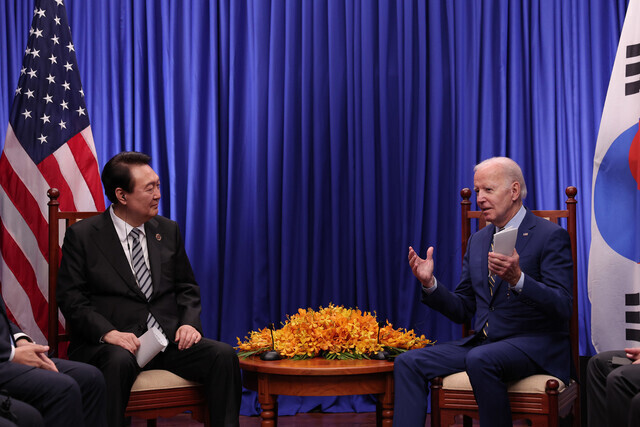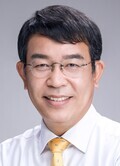hankyoreh
Links to other country sites 다른 나라 사이트 링크
[Column] Delusions of South Korea-US nuclear sharing


Back in September 2021, when he was running for president, then-candidate Yoon Suk-yeol made a security pledge stating he would demand the US deploy tactical nuclear weapons to the Korean Peninsula and look into a possible nuclear sharing arrangement.
The day after he made the remarks, however, Mark Lambert, the US deputy assistant secretary of state for Japan and Korea, responded to Yoon’s comments, saying, “US policy would not support that,” adding that he “would be surprised that the people who issued that policy don't know [. . .] what US policy is.”
Perhaps the memory of this humiliation has now faded, since now-president Yoon recently told the Chosun Ilbo newspaper in a new year interview that South Korea and the US were discussing ways to manage US nuclear forces through joint planning and joint exercises.
Explaining how South Korea and the US already share information on US nuclear weapons, draw up nuclear use plans, and conduct training on the use of nuclear weapons, Yoon said that the US position regarding his idea was “very positive.”
Apparently, the president's view that the US is willing to share some ownership, use, and control of its nuclear weapons with South Korea doesn’t seem to differ much from his original perspective back when he was a presidential candidate.
First, in order to jointly plan for the use of nuclear weapons with the US, a South Korea-US nuclear planning group (NPG) must be formed.
In the past, some American scholars have argued that this model, through which the US shares and operates tactical nuclear weapons with NATO countries, should be applied to Asian allies as well.
A small number of scholars have indeed called for an NPG aimed at keeping China and Russia in check through a collective security system similar to NATO to be established in Asia. This kind of NPG would include members like South Korea, Japan, Australia and India. However, there have never been any indications that the US government, a proponent of nuclear nonproliferation, has ever seriously considered such a plan.
On the contrary, those who suggest such plans are only met with sarcastic remarks pointing out their ignorance of US policy goals.
Besides, it also doesn’t make sense to expect the US to give South Korea exclusive preferential treatment with nuclear sharing at the expense of its relations with other allies. President Biden, who has long advocated for a nuclear-free world, would reject such ideas all the more.
In fact, Biden gave a resolute “no” when a reporter asked him at the White House whether the US was truly considering joint nuclear exercises with South Korea. There was also no mention of any plans for nuclear weapons sharing or a joint nuclear policy with South Korea in the White House statement on the matter released later.
In accordance with Yoon’s argument, for South Korea and the US to share nuclear information and jointly conduct mock exercises of nuclear weapons delivery, a South Korea-US nuclear alliance would have to be established.
Access to and use of nuclear weapons is not allowed by general combat units but only by particular experts who have been granted permission to access such nuclear weapons.
Besides this, South Korea’s military would have to take part in the operation of US strategic assets or be able to mount US nuclear warheads to South Korean fighter jets, submarines, and missiles through access to the necessary nuclear codes.
Also, in case of emergency, a special storage facility capable of deploying nuclear warheads and authorized personnel to the Korean Peninsula must be available in South Korea, Japan or Guam. However, there is currently no such US nuclear storage facility in Asia.
The South Korean military would have to exercise operational control over US nuclear warfare units or take part in decisions to use nuclear weapons, but we lack personnel who have been pre-vetted and authorized by the US. In fact, the US has never given this kind of preference to any of its allies in the world, ever.
To make matters even more complicated, the South Korean military’s main offensive weapons are under tight technical control by the US, which makes it impossible for nuclear warheads to be mounted on such weapons.
Even in the case of NATO countries, with which the US shares nuclear weapons, they are only able to participate in post-evaluations and are unable to exercise operational control over US nuclear weapons.
Similarly, even if South Korea were to conduct mock exercises with the US premised on using nuclear weapons, this would only amount to a post-evaluation of US operations or a simple notice, not a joint nuclear policy implementation system that allows the South to be involved in the planning and decision-making of nuclear weapons use.
The over 200 tactical nuclear warheads in possession of the US are gravity nuclear bombs built a long time ago to be dropped from the air to defend Europe.
However, in order to use these tactical nuclear weapons on the Korean Peninsula, where the air defense network is dense, it would be illogical to drop such bombs from the air. As such, nuclear cruise missiles launched from ships or tactical nuclear missiles launched from submarines would have to be mobilized.
The problem, however, is that the Biden administration has cut the US’ entire tactical nuclear modernization budget because it was “highly likely to be used in actual warfare.” The Biden administration’s position is that tactical nuclear weapons that are likely to be used in practice “do not exist” at all.
As such, the ignorance and delusion of claiming non-existent tactical nuclear weapons as if they were our own are simply astounding.
As president, shouldn’t Yoon Suk-yeol adopt an accurate perception of reality and dignified, rational security policies?
Please direct questions or comments to [english@hani.co.kr]

Editorial・opinion
![[Column] Park Geun-hye déjà vu in Yoon Suk-yeol [Column] Park Geun-hye déjà vu in Yoon Suk-yeol](https://flexible.img.hani.co.kr/flexible/normal/500/300/imgdb/original/2024/0424/651713945113788.jpg) [Column] Park Geun-hye déjà vu in Yoon Suk-yeol
[Column] Park Geun-hye déjà vu in Yoon Suk-yeol![[Editorial] New weight of N. Korea’s nuclear threats makes dialogue all the more urgent [Editorial] New weight of N. Korea’s nuclear threats makes dialogue all the more urgent](https://flexible.img.hani.co.kr/flexible/normal/500/300/imgdb/original/2024/0424/7317139454662664.jpg) [Editorial] New weight of N. Korea’s nuclear threats makes dialogue all the more urgent
[Editorial] New weight of N. Korea’s nuclear threats makes dialogue all the more urgent- [Guest essay] The real reason Korea’s new right wants to dub Rhee a founding father
- [Column] ‘Choson’: Is it time we start referring to N. Korea in its own terms?
- [Editorial] Japan’s rewriting of history with Korea has gone too far
- [Column] The president’s questionable capacity for dialogue
- [Column] Are chaebol firms just pizza pies for families to divvy up as they please?
- [Column] Has Korea, too, crossed the Rubicon on China?
- [Correspondent’s column] In Japan’s alliance with US, echoes of its past alliances with UK
- [Editorial] Does Yoon think the Korean public is wrong?
Most viewed articles
- 1‘We must say no’: Seoul defense chief on Korean, USFK involvement in hypothetical Taiwan crisis
- 2N. Korean delegation’s trip to Iran shows how Pyongyang is leveraging ties with Moscow
- 346% of cases of violence against women in Korea perpetrated by intimate partner, study finds
- 4[Column] Park Geun-hye déjà vu in Yoon Suk-yeol
- 5‘Weddingflation’ breaks the bank for Korean couples-to-be
- 6Will NewJeans end up collateral damage in internal feud at K-pop juggernaut Hybe?
- 7Amnesty notes ‘erosion’ of freedom of expression in Korea in annual human rights report
- 8[Interview] Dear Korean men, It’s OK to admit you’re not always strong
- 9Korean government’s compromise plan for medical reform swiftly rejected by doctors
- 10[Editorial] Japan’s rewriting of history with Korea has gone too far